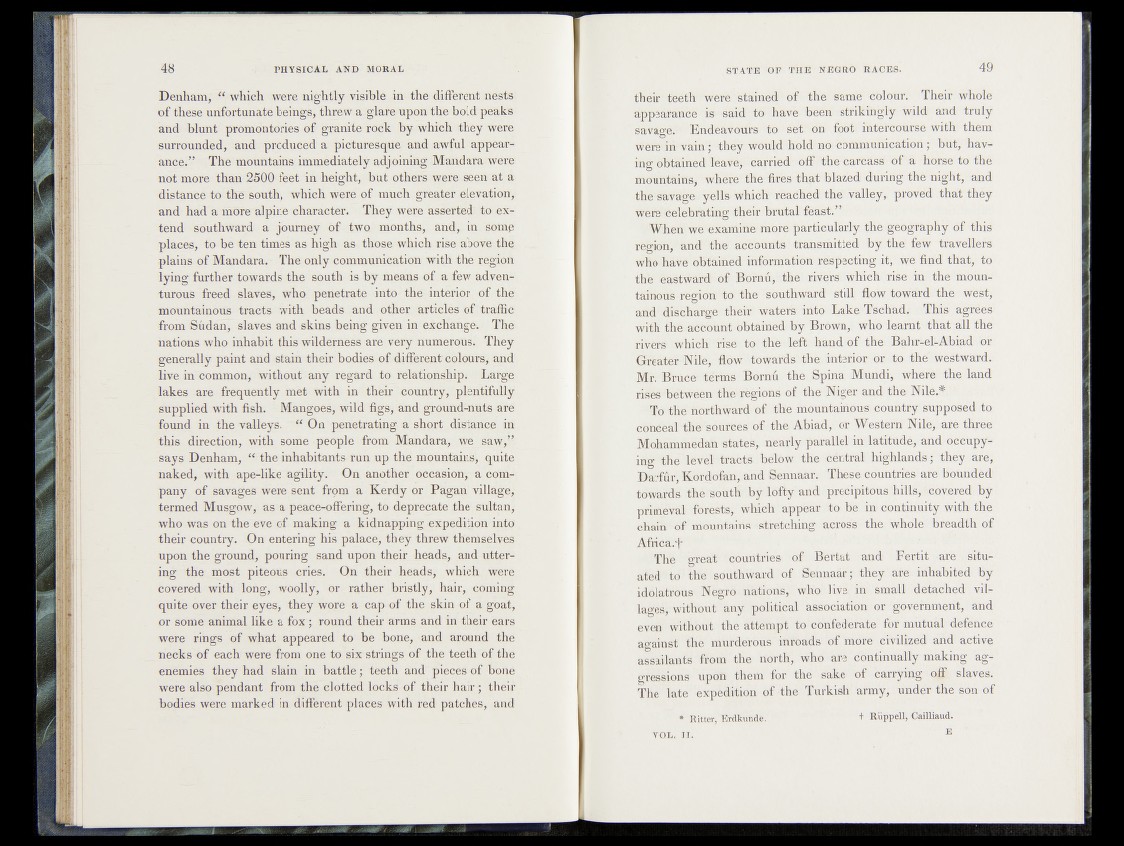
Denham; “ which were nightly visible in the different nests-
of these unfortunate beings, threw a glare upon the bold peaks
and blunt promontories of granite rock by which they were
surrounded, and produced a picturesque and awful appearance.”
The mountains immediately adjoining Mandara were
not more than 2500 feet in height, but others were seen at a
distance to the; south, which were of much greater elevation,
and had a more“ alpine character. They were asserted to extend
southward a journey of two months, and, in some
places, to be ten times as high as. those which rise above the
plains of Mandara. The only communication with the regiofi
lying further towards the south is by means of a few advent
turous freed slaves, who penetrate into the interior of the
mountainous tracts with beads and other articles of traffic
from Sudan, slaves and skins being given in exchange. The
nations who inhabit this wilderness are very numerous. They
generally paint and stain their bodies of different colours* and
live in common, without any regard to relationship. Large
lakes are frequently met with in their ' country, plentifully
supplied with fish. Mangoes, wild figs, and ground-nuts are
found in the valleys. “ On penetrating a short distance1 ih
this direction, with some people from Mandara, we saw,**
says Denham, “ the inhabitants-run up the mountains* quite
naked, with ape-like agility. On another occasion, a co'm-s
pany of savages were sent from a Kerdy or Pagan village,'
termed Musgow, as a peace-offering, to deprecate the sultan,
who was on the eye of making a kidnapping expedition into’
their country. On entering his palace, they threw themselves
upon the ground, pouring sand upon their heads, and uttering
the most piteous cries. On their heads, which were
covered with long, woolly, or rather bristly, hair, coming
quite over their eyes, they wore a cap of the skin of a goat,
or some animal like a fox ; round their arms and in their ears
were rings of what appeared to be bone, and around the
hecks of each were from one to six strings of the teeth of the
enemies they had slain in battle ; teeth and pieces of bone
were also pendant from the clotted locks of their hair ; their
bodies were marked in différent places with red patches, and
their "tefeth'were'stained of the same colour. Their whole
àpfiéàmtiüe is said ‘ to have been strikingly wild and truly
savEig# Endeavours to g on footv intercourse with them
were- in would hol'd' noncommunication ; bdt^haviïag
ëbtainedllave^dàrried off the%arcüss! of a rfiorse to the
mountains, where the fites^that blazed during the night, and
the savage» yéîfe-Vriiich'reached-fie%valley,' proved that they
were’Celebrating their brutal
When we examine more particularly the éwgraphy:éfî this
region, and" the1 accounts ’ transmitted b$i;thd few travellers
who hàvë obtained information reflecting it, we find that, to
thfe iaistward of Bornu,$She/ rivers which risein the moun-
taiholte- r’ëêfdn ’ to the ‘Southward still flow toward the we'stf*
and discharge their waters into Lake>Tschud. This,agrées
with the-account obtained by Brown,' who learnt that all the
riyljfe which • rise fdf the- left hand of the-- Bahr-ehAbiad or
Greater-Nile, flow;Hbwards the interior or -te fhe% westward.
Mr. Bruce* tdrins Bornu the Spina Mundi, where the land
rises betweem the régions of the Niger and the ’Nile.* '
» the northvyard of the mountainous: country supposed to
ctfheëal tlie sources of the Abiad, or Western Nile, are three
Mohammedah states, nearly parallel in latitude, and occupy-*
ing thcSevel tracts belôw the Central highlands,; they are,
Darfur, Kordp&n, and Sennaar. These countries are bounded
towards the south by lofty and precipitous 'hills,/ covered by
primeval forests, which appear to-be in-continuity with the,
chain of mountains stretching across the whole breadth of
Africa.-f
The great countries of Bertat and Fertit -are. situated
to the southward of Sennaar.; they are inhabited by
idolatrous Negro nations, who dive in small detached villages,
without any political association or 'government, and
even without the attempt to'cbhfederate for mutual defence
against the murderous inroads of more civilized and active
assailants from the north, who are continually making aggressions
upoïï them for the sake of carrying off slaves.
The late expedition of -the Turkish army, under the son of
* Ritter, Erdkunde. + Rüppell, Cailliaud.
VOL. II. E